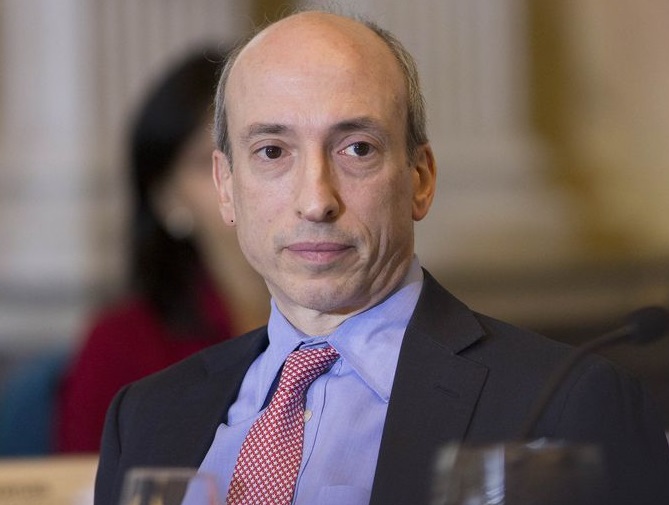By John E. Deaton, Founder and Host, CryptoLaw.
I believe we have reached a turning point in the fight against the Securities and Exchange Commission’s unfair and abusive treatment of XRP holders in its lawsuit against Ripple. So much evidence has come out in this case that exposes the outrageous actions of the SEC and the key figures behind the lawsuit, that I felt it was important to send you a complete summary of what has happened, why it’s important, and what I and 20,0001 XRP holders are doing in this fight.
It is a story of an overreaching regulator unfairly picking winners and losers in the blockchain business space, a web of insider connections and conflicts of interest, and thousands of retail investors who were egregiously harmed by the federal agency that is supposed to be protecting them.
The Key Players:
First, it is important to remind everyone of the key figures in this story.
Jay Clayton was a longtime partner at the law firm of Sullivan & Cromwell, where he notably co-engineered the Alibaba IPO in 2014. Alibaba owns Alipay, the Chinese payments service that was designed to directly compete with western fintech innovations using blockchain. Alipay has moved into cross-border remittances which is Ripple’s primary use case for XRP. When he was nominated to be SEC Chairman in 2017, he was dubbed “the most conflicted SEC Chairman in history” in an article that ran down his baggage of potential conflicts in the job. At his nomination hearing, he was reminded (and conceded) that if any matter related to a client of his from Sullivan & Cromwell came before the SEC, he would be barred from voting.
William Hinman was a longtime partner at the firm of Simpson Thacher & Bartlett, and co-engineered the Alibaba IPO with Jay Clayton. Hinman “retired” from Simpson Thacher to join the SEC as Clayton’s Director of Corporation Finance.
Ethereum was launched by the Ethereum Foundation in 2014 as an enterprise blockchain system, and its native currency, ether, was issued in an ICO to “anyone who wants to purchase” it. An early investor and co-founder was Joe Lubin. In parallel, Lubin founded…
ConsenSys, a for-profit consulting firm to promote and profit from building enterprise blockchain solutions exclusively on the Ethereum network. Lubin received 9.5% of ether. For reference, a $10,000 investment in the ether ICO and held to this day is worth more than $120 million. Thus, you can imagine Lubin and anyone else’s financial interest in ether.
ConsenSys is a client of Sullivan & Cromwell (Clayton).
The Enterprise Ethereum Alliance, a coalition of companies built to market Ethereum as an enterprise solution, includes Simpson Thacher & Bartlett (Hinman).
This is how Clayton, Hinman and Lubin were connected as this story began.
The “free pass” for Ethereum’s cryptocurrency, ether:
Papers filed in court and public statements on video from Lubin, Hinman and others linked to ConsenSys reveal that multiple meetings between ConsenSys and senior SEC officials were held in 2017 and 2018 to lobby the agency to give the ether token a regulatory “free pass”.
In Hinman’s deposition (taken in July by Ripple’s legal team), it is clear that Hinman directed his staff to set up a meeting with Lubin and Consensys on December 13, 2017. It should not be lost on you that the SEC was investigating and prosecuting dozens of ICOs that orchestrated crowd-fundraising exactly the way Lubin and Ethereum did (i.e., anyone could buy pre-mined ether tokens and their funds were used to build the blockchain). In fact, many people refer to the period as the “2017 ICO craze”.
The SEC actually sued a company called Telegram and achieved a preliminary injunction that prevented the development of its blockchain for conducting an ICO substantially similar to ether’s. At the time of this December 13, 2017 meeting, Ripple was not under investigation and XRP had been publicly sold and traded for over 4 years. XRP was also battling ether for the number 2 cryptocurrency by market cap behind bitcoin.
A key meeting was organized on March 28, 2018, by Andreessen Horowitz, where Ethereum investors presented a proposal for a regulatory free pass for ether. I have reviewed that “safe harbor” proposal thoroughly, and the only digital asset it even mentions is ether. Furthermore, key elements of the document were incorporated directly into Hinman’s speech saying that ether is no longer a security. In essence, Hinman’s speech was suggested by and partly written by some of Ethereum’s top investors.
We know that Lubin and Consensys met with the SEC at least three more times before Hinman’s June 14, 2018, speech where he declared that, “putting aside the fundraising” conducted by Ethereum with its token, ether is not a security and therefore not subject to SEC regulation.
ConsenSys has been battling to gain market share of the cross-border payments market for Ethereum, competing directly with Ripple’s cross-border payments solution on the XRP ledger. After Hinman’s speech, Lubin publicly predicted that Ethereum would be the only enterprise platform to get a free pass from the SEC, and that “a reckoning is coming” for others — specifically Ripple. Mike Novogratz, Lubin’s college roommate and a major investor in ether, predicted just nine days before the speech that he would “bet dollars to donuts” that the SEC would declare ether to not be a security.
If you know Mike Novogratz, he cares deeply about his public perception and credibility and he would not go out on a limb and guarantee what the SEC was going to say unless he was assured of it from someone with personal knowledge. Novogratz, like Lubin, predicted that the SEC was going to select one token and its promoters and go after them to shut them down as an example. Shortly after Lubin and Novogratz’s public predictions, we now know that Ripple was notified of an informal investigation.
Meanwhile, while Lubin and ConsenSys were holdings meetings with the SEC, future SEC Chairman Gary Gensler told an MIT audience that he didn’t see enough regulatory clarity in the market for digital assets, and said “even Ripple” needed clarity.
The Ripple Lawsuit:
The XRP cryptocurrency was never issued in an ICO, operates on a fully decentralized ledger and has been used by project developers and consumers with no connection to Ripple for years. XRP fits the criteria of Hinman’s 2018 speech better than ether does. In fact, Ripple controls less than 4% of the validators on the XRP Ledger. Ripple once objected to a change on the ledger but was overruled by the majority of validators. The point is that the XRP network is arguably more decentralized than the ether network.
The Ripple lawsuit was filed on Clayton’s last full day at the SEC in 2020. The timing was very curious. About two weeks before Clayton directed the suit be filed against Ripple, former SEC Commissioner Joseph Grundfest sent a letter to Clayton stating that he should not file the lawsuit as he was leaving the SEC. Grundfest argued that no exigency existed to file considering that XRP had been traded for over 7 years. Grundfest informed Clayton that the SEC could not make any material distinction between XRP and ether and if he filed the case it would call into question the SEC’s exercise of discretion. He also warned Clayton that the mere filing of the lawsuit would cause unprecedented billions of losses to individual investors with no connection to Ripple. When the suit was filed, XRP lost $15 billion in market cap. (It should be noted that Grundfest was retained by Ripple. It doesn’t change what he said being true.)
It’s also important to note that Clayton was the deciding vote to sue Ripple, on the 5-member commission. He chose to bring the most consequential enforcement action since the 1946 Supreme Court decision on Howey against Ripple, a direct competitor of his former law firm’s client, ConsenSys.
When challenged in court by Ripple’s legal team on the contradiction between Hinman’s speech and the SEC’s actions, the SEC has attempted to disown Hinman’s speech as market guidance or a determination by the SEC, claiming it was just his personal opinion and irrelevant to the case. In fact, the SEC had Hinman sign an affidavit that his speech was “only” his personal opinion and not that of the SEC.
This flimsy argument is now being torn apart by Ripple’s legal team, which has launched a “fair notice and due process” defense that could decide the case in summary judgment and possibly set a sweeping precedent that limits the SEC’s power to regulate cryptocurrencies.
All available evidence indicates that Hinman’s speech was intended as market guidance by everyone at the SEC; it was believed to be market guidance by Lubin, Ethereum Foundation and ConsenSys, and taken as market guidance by the media and investors. Multiple documents issued by SEC legal staff on other matters reference the Hinman speech as representing a “recognition” of Ethereum and ether by “the Commission”. The SEC has also admitted in court that no investigation was ever opened against ether. This means the agency never considered enforcement action against Ethereum despite its 2014 ICO and the Ethereum Foundation’s large-scale sales to speculators, like to Novogratz.
To date, ether is still the only altcoin in the market that the SEC has affirmatively anointed as a currency or commodity and not a security, even though it’s now trying to pretend it never anointed it, and Chairman Gensler is trying to pretend he never said in 2018 that Ripple deserved regulatory clarity.
Why did Ethereum get a free pass and Ripple get sued?
The “fair notice” defense in the Ripple case has led to this embarrassing question for the SEC. Here are some key observations:
- The SEC has taken a well-deserved battering in court since it filed the Ripple lawsuit, and it raises another question: why file such a flawed case that could ultimately backfire so badly and set a sweeping precedent limiting the agency’s power?
- Despite the SEC fighting tooth-and-nail to stop it, Ripple was granted the right to depose Hinman and now they are battling to get SEC documents showing who drafted, edited and saw the Hinman speech in advance. Those discovery documents revealed the speech was attached to 63 emails in the drafting phase, but the SEC refuses to disclose who was on them. Discovery also revealed that Hinman only provided a draft to Clayton and no other commissioner. This means Commissioner Hester Peirce, a.k.a. “Crypto Mom”, was not allowed to give input. The last official meeting between the SEC and Lubin and Consensys before the speech, was June 8, 2018. And thanks to the investigative work of the XRP Army on social media, I have obtained a copy of the March 2018 Andreessen Horowitz investor group memo to Hinman, advocating for a specific free pass for ether. We have proof that Hinman used the investors’ memo as the basis of his speech.
- The Ripple lawsuit, filed on Clayton’s last day, has slowed Ripple’s interbank payments business and given ConsenSys an opening to try to pull ahead. Two months before the Ripple lawsuit was filed, Clayton’s firm of Sullivan & Cromwell assisted ConsenSys to acquire the Quorum interbank payments platform. And it has brought a lot of scrutiny to the web of personal financial interests tied up between Clayton, Hinman, Lubin and the Hinman speech.
Here is what we’ve documented:
- Almost immediately after leaving the SEC, Clayton was hired by One River Digital Asset Management, a crypto hedge fund that “quietly” made a huge financial bet exclusively on bitcoin and ether starting shortly before the Ripple lawsuit was filed. What a coincidence.
- Less than a month after filing the Ripple lawsuit, SEC Enforcement Director Marc Berger left the agency to join Simpson Thacher & Bartlett, of the Enterprise Ethereum Alliance. What a coincidence.
- From 2017 to 2020 – the same years he served at the SEC – Hinman received over $15 million in payments from Simpson, Thacher & Bartlett. What a coincidence.
- Immediately after leaving the SEC, Hinman returned to Simpson Thacher & Bartlett. He also was named senior advisor to a new $2 billion crypto fund at Andreessen Horowitz. What a coincidence.
My Role and Why I’m Doing This:
I am not here to defend the company Ripple in any manner. Ripple’s legal team is as impressive as it can be. Ripple has former SEC Chair Mary Jo White as counsel, along with a former Director of Enforcement and a former Director of Corporation Finance on its team.
The truth is that all of these cryptos start out as a security in the first few years. Arguably, bitcoin is the only crypto asset not to originate a security. But even bitcoin was sometimes considered a security by the SEC in 2014 and 2015.
I now represent 20,0001 XRP holders who were harmed by the SEC’s lawsuit against Ripple. I got involved in this from the very beginning. The SEC filed the case on December 22, 2020. When I read the Complaint I knew that this case was NOT about securities laws but about something very different. I acted immediately.
Nine days later, on January 1, 2021, I filed a Writ of Mandamus against the SEC in Rhode Island Federal Court, asking for the Court to order the SEC to amend its Complaint. Specifically, I wanted the SEC to exclude characterizing as unregistered securities the XRP held by my clients that were purchased in the secondary market from Coinbase and other exchanges and not from Ripple. Many of my clients had never heard of Ripple until the lawsuit. It is difficult to enter into a common enterprise and rely on the efforts of someone you’ve never heard of.
The SEC objected to my Writ of Mandamus and stated that only the Southern District Court of New York – where Ripple lawsuit was filed – could hear any matter related to XRP. I immediately withdrew my Writ and filed a motion to intervene as a defendant in the SEC case against Ripple. The motion has been fully briefed and we are waiting for a decision.2 If the SEC had limited its claims against Ripple to early specific distributions of XRP, I would have never filed anything.
But, for the first time in SEC history in a non-ICO setting, the SEC is claiming that all XRP, even the XRP purchased by people in the secondary market with no connection with Ripple, are unregistered securities. The SEC is claiming this 8 years after it allowed XRP to be publicly traded and after it allowed Ripple to purchase a minority stake in MoneyGram knowing XRP would be utilized. After approving that acquisition, the SEC is now claiming that the XRP distributed by Ripple to MoneyGram, that MoneyGram sold to Coinbase, and that Coinbase sold to me, or you, are all unregistered securities. It’s madness.
As far as my role or potential bias in this case, I am not being paid for my efforts and I have used my own money to fund the intervention. I have no connection to Ripple or its attorneys. If I have a bias, it’s a free-market, libertarian bias. Plus, if one looks at the stories I’ve read of people’s life savings being wiped out because of the SEC’s actions, you will understand why I’m doing this as well. If someone gets harmed because they made a bad investment that’s fine. But it shouldn’t be because government officials are picking the winners and the losers in an environment where there is no regulatory clarity at all.
With all these facts as our greatest strength, along with our numbers, we will fight to the end.
1 The number of XRP holders who have joined the putative class as amici curiae has grown to more than 60,000 since the publication of this blog post.
2 On October 4, 2021, in response to the Motion to Intervene, U.S. District Judge Analisa Torres granted the movants and me “friend of the court” status (amici curiae) “to assist the Court by briefing legal issues relevant to the case as approved in advance by the Court. The Court contemplates that such assistance will be most beneficial during briefing on dispositive motions, but may exercise its discretion to request or deny further applications as appropriate.”









